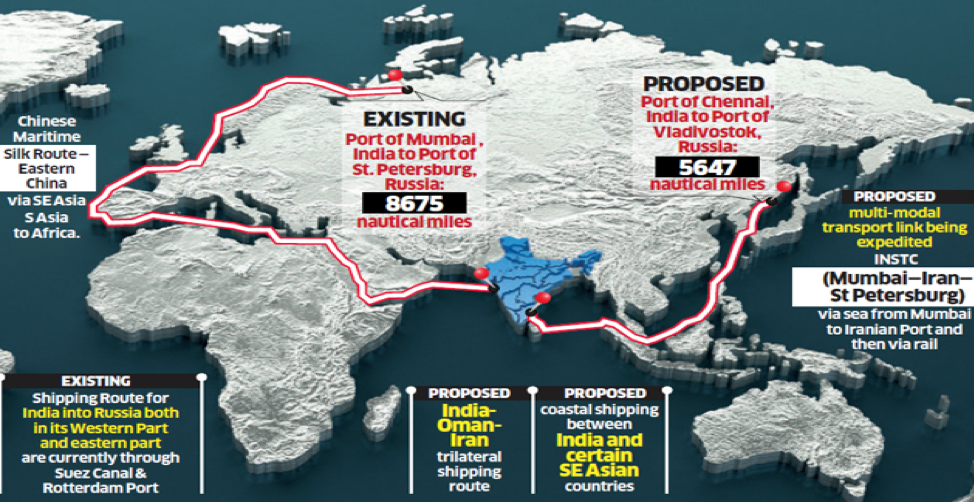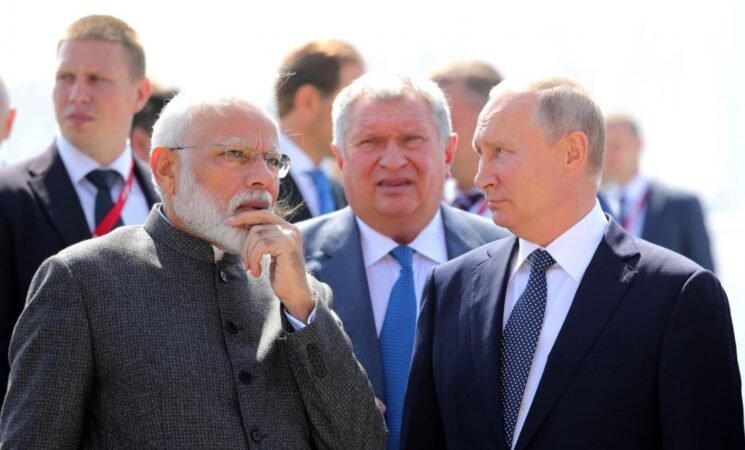23 September 2021, NIICE Commentary 7373
Ranjitabh Singh Yadav
During Prime Minister Narendra Modi’s visit to Vladivostok in September 2019, a Memorandum of Intent was signed for the ‘Development of Maritime Communications between India’s eastern Port city Chennai and the Russia’s eastern port city Vladivostok. The aim is to address current lack of connectivity between India and Russia and to increase India’s involvement with the Russian Far East. Currently, India and Russia are linked via European route, which takes on an average 40-45 days to complete one-way distance. With the completion of this proposed Sea route, it is estimated that that the new route will cut the duration of the cargo shipping to half i.e. 24-25 days, which otherwise normally would take 40-45 days. The existing shipping route from India to Russia currently passes through the Suez Canal via port of Rotterdam, connecting Mumbai port with St Petersburg. It covers a distance of 8675 nautical miles, whereas the proposed Chennai-Vladivostok Sea route covers only 5647 nautical miles, yielding substantial cost savings.
 Apart from cost effective and time reduction benefits, this route also provides an opportunity to India for realization of its ‘Act East policy’. Through this route Indian government can manage its economic, and political relations and security concern in the Indo- Pacific. This route is in line with New Delhi’s own Indo-Pacific vision of deepening and strengthening its geopolitical and geo-economics footprint in the Indo-Pacific region. Realization of this vision could be a “game-changer" in injecting much-needed momentum for India’s economic relation with Russia. It is to be noted that India is building nuclear power plant with the help of Russia in Kudankulam (Tamil Nadu Coast), opening of proposed maritime route will provide boost up to this project. According to government officials, this maritime route can boost up India’s inland waterways through the help of Russia’s low draft vessel technology system, which is leveled as best in the world. Greater participation from Moscow in this project can ensure development of more than 5000 km. inland waterways and can increase cargo handling capacity by ports to 2,600 million tones, which are one of the strategic parts of Prime Minister Narendra Modi’s “Maritime India Vision 2030”.
Apart from cost effective and time reduction benefits, this route also provides an opportunity to India for realization of its ‘Act East policy’. Through this route Indian government can manage its economic, and political relations and security concern in the Indo- Pacific. This route is in line with New Delhi’s own Indo-Pacific vision of deepening and strengthening its geopolitical and geo-economics footprint in the Indo-Pacific region. Realization of this vision could be a “game-changer" in injecting much-needed momentum for India’s economic relation with Russia. It is to be noted that India is building nuclear power plant with the help of Russia in Kudankulam (Tamil Nadu Coast), opening of proposed maritime route will provide boost up to this project. According to government officials, this maritime route can boost up India’s inland waterways through the help of Russia’s low draft vessel technology system, which is leveled as best in the world. Greater participation from Moscow in this project can ensure development of more than 5000 km. inland waterways and can increase cargo handling capacity by ports to 2,600 million tones, which are one of the strategic parts of Prime Minister Narendra Modi’s “Maritime India Vision 2030”.
Economic benefits for India
In pursuing the Vladivostok-Chennai Maritime corridor, numerous economic benefits can be ensured for both the countries. In terms of energy till date, countries of the Middle East region are the largest supplier of oil and gas to India. Through this route, Indian companies can get extraction opportunity in Russia’s Far East (RFE) Energy resources, which may provide energy security to India by reducing countries dependency on volatile Arabian energy resource market. Apart from energy resources, Russian Far East region holds other resources such as- huge land area, timber, forest resources, tin, gold, diamonds, rare earth minerals, nickel, cobalt coal etc.
The Russian government has announced several initiatives to attract foreign investments in the region, especially in areas of Agriculture, Infrastructure development, and also invites participation in the timber industry, mining of mineral resources (coal and diamonds), and precious metal deposits (gold, platinum, tin, and tungsten), opportunities lies in these areas for collaborations for both Indian and Russian companies. For the development of the RFE, a USD 1 billion ‘Line of Credit’ has been announced by the Indian government. Through this Sea route both Indian and Russian government are hoping to upscale their trade relations to USD 30 billion by 2025. This sea route also provides geopolitical thrust to India and Russia’s strategic and mutual partnership in Indo-Pacific region to counter growing presence of Chinese dominance.
India’s Geopolitical Interests
As the proposed maritime corridor between Chennai and Vladivostok passes through South China Sea, Chinese government is very suspicious about this project. Historically, India has enjoyed preeminence position in the Indian Ocean, but in recent times growing Chinese influence has diminished that importance. This project is highly conducive for India to regain its influence in the Indian Ocean and its neighborhood. The proposed sea route is an opportunity for India to develop its own trade route independent of China’s sphere of influence. India’s maritime presence will be significant through the passing of proposed Chennai-Vladivostok Sea route from South China Sea that will also build the potential for ‘Indian naval operations’ in the Indo-Pacific. Thus, it can be observed that this proposed corridor will help India to counter-balance the Chinese influence in the Indo-Pacific region.
India is further initiating its presence in the Indo-Pacific via “Quadrilateral Security Dialogue (QUAD)”- a strategic dialogue with US, Japan and Australia to curtail the aggressive China’s intentions to control the Indian Ocean and to counter its Maritime Silk Route project. The Chennai-Vladivostok Sea corridor is enhancing India’s interests in the South China Sea. For instance, ONG Videsh- an Indian oil company is exploring energy resources in Vietnamese oil block in the South China Sea. Therefore, India’s naval presence in the Indo-Pacific will have serious implications for China’s ‘String of Pearls strategy’ and its legal status in the South China Sea. The Russian-Indian cooperation for developing such vibrant Sea corridor is really an influential effort to counter China’s growing influence in the region. Moreover, it has potential for India to explore new relations to serve its national interests with other maritime countries of the region.
The proposal to open new maritime route makes economic and strategic sense for both India and Russia. The proposal could help India and Russia to explore new trade opportunities in the maritime neighborhood. For India, it would also help in securing access to natural resources that is crucial for its economic growth. Moreover, from the geopolitical point of view, it would also help in countering China’s ambitions of global dominance through this region.

